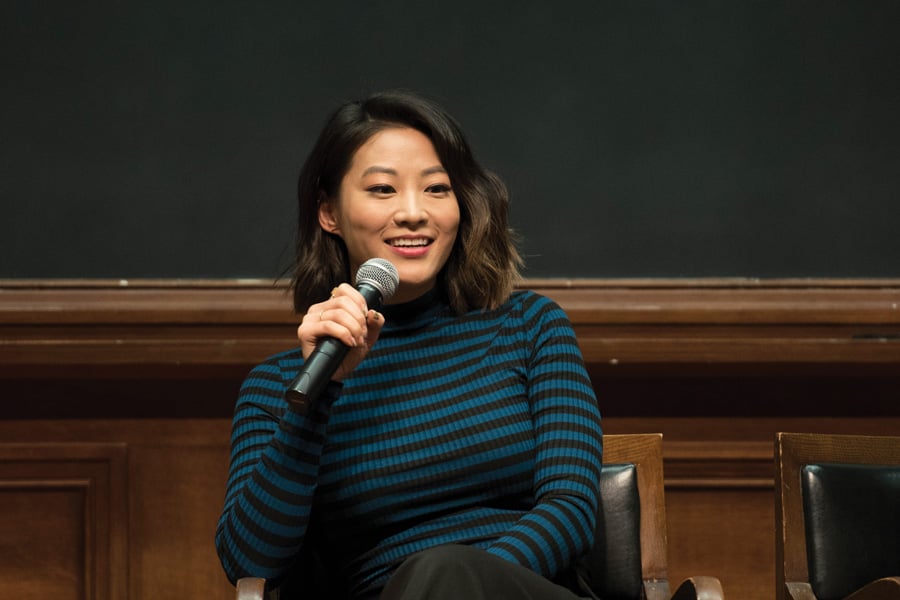‘Teen Wolf’ star talks about Asian-American representation in media
Katie Pach/Daily Senior Staffer
Arden Cho speaks to students at Harris Hall. The “Teen Wolf” star talked about the lack of Asian American representation in the media and said the industry needs more Asian American producers and writers to tell their stories.
May 1, 2017
Arden Cho, who is best known for her role as Kira Yukimura in MTV’s “Teen Wolf,” said during an event Sunday that more writers and producers need to tell Asian-American narratives as a way to increase representation in the media.
Cho spoke to about 150 people in Harris Hall for Taiwanese American Students Club and Pi Alpha Phi’s annual spring speaker event. TASC president Steven Gu, a Weinberg junior, told The Daily the event often focuses on celebrating Asian-American heritage.
Gu said the club decided to invite Cho because the audience would be able to find her relatable, as she is also someone who struggles with her Asian-American identity.
“Growing up as an Asian, you do feel a little different sometimes,” Gu told The Daily. “She talks about how (when) she goes to Asia, she doesn’t really feel Asian. (When) she’s here in the U.S., she doesn’t really feel American. I think all Asian Americans can kind of connect with that.”
Cho said she was partially drawn to acting because she was unhappy there was nobody she felt she could relate to in the media. Growing up, she said she felt ugly and alienated as an Asian because the only beauty standards she saw on television celebrated women who were white with blonde hair and blue eyes.
Speaking about the recent controversy of Scarlett Johansson being cast as the Japanese female lead in “Ghost in the Shell,” Cho said executives often don’t choose Asian-American actors because they are concerned about ratings.
“Hollywood always takes shots on no-named actors, always if they’re white,” Cho said. “How many times have you guys seen a no-named white girl or white guy become famous overnight because they were the lead? They do not take a chance with an Asian actor.”
In addition to a lack of representation, Cho said Asian-American actors often find themselves playing the same passive and quiet characters. Rather than continuing to create one-dimensional roles that perpetuate stereotypes, Cho said movies should feature more diverse characters.
Cho said she avoids stereotypical Asian-American roles and would not want to be cast as a “sexy, hot Asian girl” or an “old, white guy’s super young Asian wife.”
To change the entertainment industry, people need to support shows that star Asian-American actors, Cho said. Shows such as “Selfie,” which combated negative stereotypes against Asian-American men by casting John Cho — known for the “Harold & Kumar” series — as the “heartthrob” male lead, get cancelled mid-season due to a lack of viewers, she said.
“People say, ‘Well that’s why we don’t make Asian lead shows: because they don’t get watched’,” Cho said. “In the end of the day it’s about the ratings, it’s about the viewers. You can help so much (and) change this industry, just by watching.”
Cho also said more Asian Americans should be writing and producing shows that portray complex Asian characters. Only these writers and producers can make create stories that tell an Asian-American narrative, she said.
Despite the discouraging statistics of Asian-American representation in the media, Cho said she has hope for the future. The industry is currently changing, and Asian Americans are finally starting to find their voice, she said. There are more opportunities for younger Asian-American actors right now than when she first started her career, she said.
Communication sophomore Jennifer Spottz said she attended the event because she is also an Asian American who aspires to be an actor one day.
“(Cho) spoke really eloquently (about) a lot of the issues that Asian-American actors come across, and it’s clear that it means a lot to her,” Spottz told The Daily. “(Representation) is improving, and I hope it continues to get better so that girls like me have a chance.”
Email: [email protected]
Twitter: @ck_525


